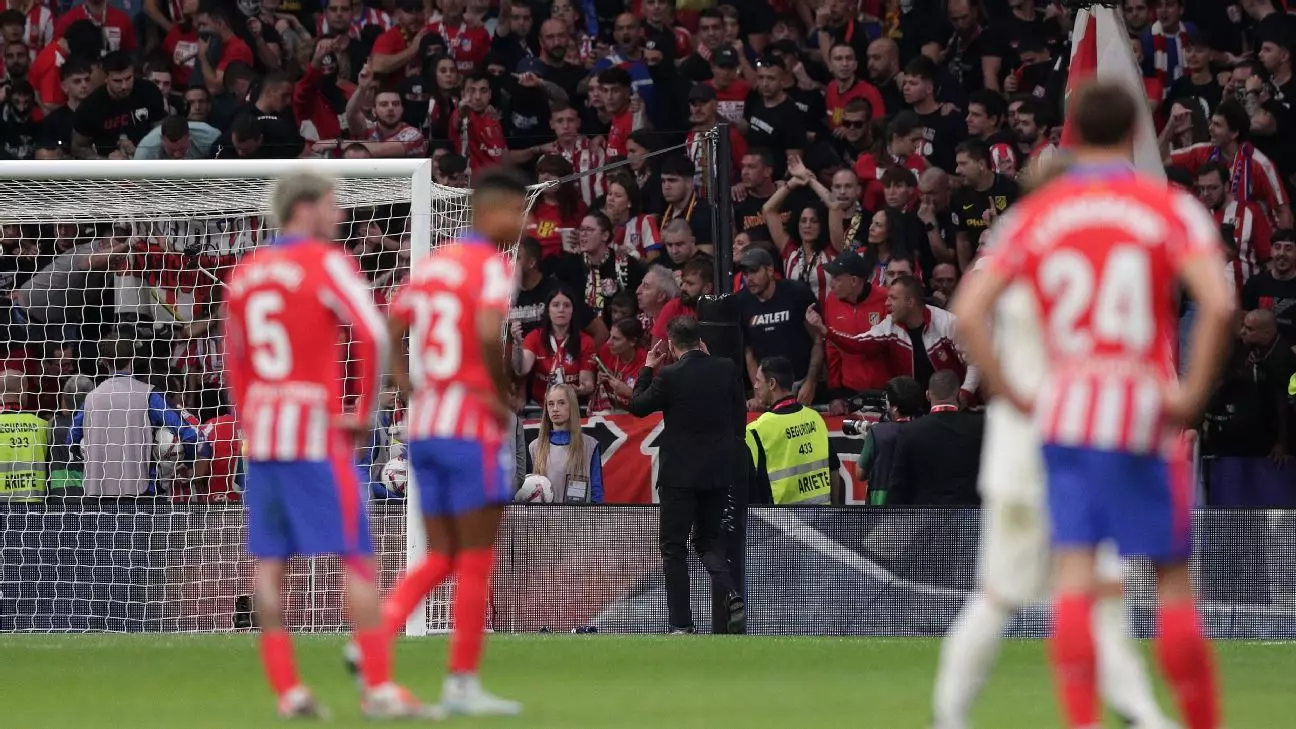The recent Madrid Derby between Atlético Madrid and Real Madrid unfolded in a manner that highlighted the ongoing struggles of maintaining sportsmanship within football. Events took a troubling turn when fans of Atlético threw lighters and plastic bottles onto the pitch, prompting a suspension of the match. The incident occurred just after Éder Militão scored for Real Madrid, resulting in a significant disruption to the highly anticipated clash. Following a 15-minute delay, the game resumed, eventually concluding in a 1-1 draw with Atlético’s Ángel Correa equalizing. However, the repercussions of this incident extended beyond the field.
In the aftermath, the Spanish football federation (RFEF) took decisive action against Atlético Madrid, imposing a three-game partial stadium closure of the Fondo Sur—a stand notorious for similar incidents. In addition to this sanction, the club was hit with a substantial fine of €45,000 (approximately $49,000). Such measures reflect an ongoing commitment to uphold the integrity of the sport, though debates about their effectiveness linger. Atlético Madrid has indicated intentions to appeal this ruling, as they continue to identify and ban fans involved in the disturbance. The club’s proactive approach to address this behavior suggests a recognition of the need for reform within their fan base, although one must question whether these actions are sufficient for lasting change.
To enhance security measures, Atlético Madrid has announced a shift in their regulations, banning clothing intended to obscure identities, such as balaclavas. This decision underscores the club’s awareness of recent trends among spectators that threaten the safety and enjoyment of the game. However, one must consider whether policy adaptations are enough to deter such incidents or if deeper-rooted cultural issues among certain fan factions need to be addressed.
In the wake of these events, both coach Diego Simeone and captain Koke offered their perspectives on the situation. They condemned the fan actions but also implied that such incidents may be fueled by provocations from players, specifically referencing the exuberant celebration of Real Madrid’s goalkeeper, Thibaut Courtois. This commentary signals a complex relationship within football, where actions on the pitch can reverberate throughout the stands, ultimately impacting player-fan dynamics. The dialogue introduced by Simeone suggests the necessity for communication and understanding between athletes and fans to cultivate a more respectful environment.
Real Madrid’s coach, Carlo Ancelotti, praised the referee’s decision to stop the match as a necessary measure to ensure safety. Ancelotti’s acknowledgment of what transpired indicates a growing recognition of the critical role referees play in maintaining order during high-stakes matches. By supporting the official’s requirement for player and fan decorum, Ancelotti emphasizes a collective responsibility for preserving the dignity of football.
The events that transpired during the recent Madrid Derby serve as a poignant reminder of the challenges modern football faces regarding fan behavior. Atlético Madrid’s sanctions and their plans for reform represent a step in the right direction, yet the underlying issues of fan engagement and athlete accountability require deeper examination. Emphasizing mutual respect between players and supporters may ultimately foster a safer, more enjoyable environment for all involved in the beautiful game.

